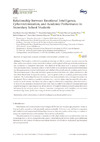Identificador persistente para citar o vincular este elemento:
https://accedacris.ulpgc.es/jspui/handle/10553/75492
| Campo DC | Valor | idioma |
|---|---|---|
| dc.contributor.author | Martínez-Martínez, Ana María | en_US |
| dc.contributor.author | López-Liria, Remedios | en_US |
| dc.contributor.author | Aguilar-Parra, José Manuel | en_US |
| dc.contributor.author | Trigueros, Rubén | en_US |
| dc.contributor.author | Morales Gázquez, María José | en_US |
| dc.contributor.author | Rocamora-Pérez, Patricia | en_US |
| dc.date.accessioned | 2020-11-12T19:33:58Z | - |
| dc.date.available | 2020-11-12T19:33:58Z | - |
| dc.date.issued | 2020 | en_US |
| dc.identifier.issn | 1661-7827 | en_US |
| dc.identifier.other | Scopus | - |
| dc.identifier.uri | https://accedacris.ulpgc.es/handle/10553/75492 | - |
| dc.description.abstract | The benefits attributed to emotional intelligence (EI) in a school environment can be observed in areas such as interpersonal relationships, psychological well-being, academic performance, and avoidance of disruptive behaviors. The objective of this study was to analyze a sample of 3451 adolescents from a secondary school to test whether EI is a protector against cybervictimization and the repercussions of cybervictimization, and whether EI has an influence on academic performance. The instruments used in the study included a questionnaire of risk factors for cybervictimization—the Trait Meta Mood Scale 24 (Spanish version)—and the global marks or academic performance of the students. The relationships between the variables were analyzed and a structural equation model was developed. The correlations revealed that there was a positive relationship between EI and student academic performance, but there was also a negative relationship regarding cybervictimization. In other words, students with lower EI were more likely to suffer from cybervictimization and could experience negative repercussions on school success. Through EI training and addressing disruptive behaviors by focusing on school climate, classroom management, and discipline, we can create emotional regulation guidelines among students to eradicate disruptive behaviors. | en_US |
| dc.language | eng | en_US |
| dc.relation.ispartof | International Journal of Environmental Research and Public Health | en_US |
| dc.source | International Journal of Environmental Research and Public Health [ISSN 1661-7827], v. 17 (21), 7717, (Noviembre 2020) | en_US |
| dc.subject | 3212 Salud pública | en_US |
| dc.subject.other | Academic Performance | en_US |
| dc.subject.other | Cybervictimization | en_US |
| dc.subject.other | Emotional Intelligence | en_US |
| dc.title | Relationship between emotional intelligence, cybervictimization, and academic performance in secondary school students | en_US |
| dc.type | info:eu-repo/semantics/Article | en_US |
| dc.type | Article | en_US |
| dc.identifier.doi | 10.3390/ijerph17217717 | en_US |
| dc.identifier.scopus | 85093962145 | - |
| dc.contributor.authorscopusid | 57219563928 | - |
| dc.contributor.authorscopusid | 28767849600 | - |
| dc.contributor.authorscopusid | 54973757100 | - |
| dc.contributor.authorscopusid | 56660596800 | - |
| dc.contributor.authorscopusid | 57216158820 | - |
| dc.contributor.authorscopusid | 18438208400 | - |
| dc.identifier.eissn | 1660-4601 | - |
| dc.description.lastpage | 12 | en_US |
| dc.identifier.issue | 21 | - |
| dc.description.firstpage | 1 | en_US |
| dc.relation.volume | 17 | en_US |
| dc.investigacion | Ciencias de la Salud | en_US |
| dc.type2 | Artículo | en_US |
| dc.description.notas | This article belongs to the Special Issue Psychosocial Factors and Health in Education: An Interdisciplinary Approach | en_US |
| dc.utils.revision | Sí | en_US |
| dc.date.coverdate | Noviembre 2020 | en_US |
| dc.identifier.ulpgc | Sí | en_US |
| dc.contributor.buulpgc | BU-MED | en_US |
| dc.description.sjr | 0,747 | |
| dc.description.jcr | 3,39 | |
| dc.description.sjrq | Q2 | |
| dc.description.jcrq | Q1 | |
| dc.description.scie | SCIE | |
| dc.description.ssci | SSCI | |
| item.grantfulltext | open | - |
| item.fulltext | Con texto completo | - |
| crisitem.author.dept | GIR Investigación Básica y Aplicada en Ciencias de la Salud | - |
| crisitem.author.dept | Departamento de Enfermería | - |
| crisitem.author.orcid | 0000-0003-0338-0339 | - |
| crisitem.author.parentorg | Departamento de Ciencias Clínicas | - |
| crisitem.author.fullName | Morales Gázquez, María José | - |
| Colección: | Artículos | |
Citas SCOPUSTM
22
actualizado el 08-jun-2025
Citas de WEB OF SCIENCETM
Citations
15
actualizado el 22-feb-2026
Visitas
58
actualizado el 10-ene-2026
Descargas
50
actualizado el 10-ene-2026
Google ScholarTM
Verifica
Altmetric
Comparte
Exporta metadatos
Los elementos en ULPGC accedaCRIS están protegidos por derechos de autor con todos los derechos reservados, a menos que se indique lo contrario.
